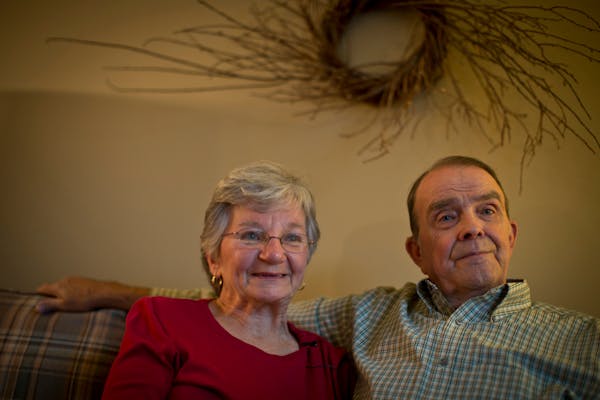Minnesota's fight over same-sex marriage is on the verge of claiming Greg and Veronica Seivert's lifelong devotion to the Catholic Church.
The Seiverts' shift away from the church began in the fall of 2008, when their college-age daughter told them she was a lesbian. As the family began adjusting to the news, the Seiverts became increasingly uncomfortable with the church's preaching against same-sex marriage. In September, they sent their pastor a letter explaining they were leaving the parish. Soon after, the priest sent back a letter, calling same-sex attraction a "disorder" similar to "alcoholism ... or clinical depression, or kleptomania."
Now the Seiverts find themselves in a wrenching personal and spiritual conflict, torn between supporting their daughter and a church whose leaders are unwavering in their opposition to same-sex marriage.
"I am wrestling right now with can I in good conscience still be part of this church," said Greg Seivert, who has attended St. Matthew's Catholic Church in St. Paul for 34 of his 59 years. "It's so much part of the fabric of my life. I am really torn. I feel really alienated from what was once my home."
As Minnesota edges toward a showdown over a constitutional amendment that would ban same-sex marriage, the Seiverts' struggle is one facing many Minnesotans of faith, as they feel the tug of their conscience pulling them away from their church.
Not mean-spirited or bigoted
Jason Adkins, executive director of the Minnesota Catholic Conference, said that while Catholics might struggle with the amendment for personal reasons, when they hear from the church directly, "they recognize that the Catholic position is not ... meant to be mean-spirited or bigoted toward our fellow brothers and sisters with same-sex attraction."
Greg Seivert grew up in Hutchinson, where his mother baked brownies for the nuns, clergy joined back-yard barbecues and he relished priest-led ghost hunts in a nearby cemetery.
Veronica Seivert was raised in Mexico, with deeply devout parents and an altar in her home.
"You can't be more Catholic than Mexico," she said.
When their daughter Ana came out, the Seiverts struggled to recalibrate their expectations for her life.
Now, said Veronica Seivert, 56, "I just want her happiness. That's what I want, for her to be who she is, to meet someone and have a life with someone just like we did."
A confession, transformation
Something else compelled them on the journey toward acceptance.
When Ana finally revealed the secret she'd been carrying, Greg Seivert said, "She was just transformed. When she was able to name her loving feelings for another woman, she was just filled with energy; there was brightness in her eyes. She felt like she was home."
Seivert paused briefly, his eyes tearing slightly. "And boy, how could I say no to that, to say no and turn that light off?"
Not long after, Twin Cities Archbishop John Nienstedt started ramping up his involvement and directed his priests to press their followers on the need to vote for the amendment.
St. Matthew's new pastor, the Rev. Michael Rudolph, took up the cause. As his activity intensified, so too did the Seiverts' alienation from their church. Veronica Seivert wanted to meet with Rudolph and tell him of their decision to leave, but Greg Seivert didn't want a confrontation. Instead, they decided to send a letter and a final stewardship check.
Rudolph responded days later with a two-page letter, warning that those who act on same-sex attraction face "a spiritual dead end." With God's help, he wrote, Catholics are called on to help those "overcome disordered patterns in our life."
The Seiverts were aghast. To this day they have not shared the letter with their daughter.
"To tell us our daughter, who she is, is spiritual death," Veronica Seivert said. "I totally refuse to believe that."
Greg Seivert said the letter represented a brand of Catholicism far less caring and compassionate than the one he grew up with.
"When I read it, I thought, 'Damn it, I was right about this guy,'" Seivert said. "He thinks people can chose to be gay or not. It's an embarrassment."
Rudolph declined to be interviewed for this story, directing all questions to Adkins, at the Catholic Conference.
Adkins said the church does not discriminate but "it expects the same thing of all of us: chastity and holiness. There are many Catholics who experience same-sex attraction and feel liberated by the church's teaching, not restricted or shunned."
The experience has hardened the Seivert family's attitude on the proposed marriage amendment.
At a recent birthday celebration, the extended family got a chance to see Ana with her partner.
Greg Seivert's mother, a quiet, deeply private Catholic, had been silent on the amendment until then.
Amid the festivities, she slid up next to her granddaughter and whispered, "I am voting no."
Baird Helgeson • 651-925-5044
